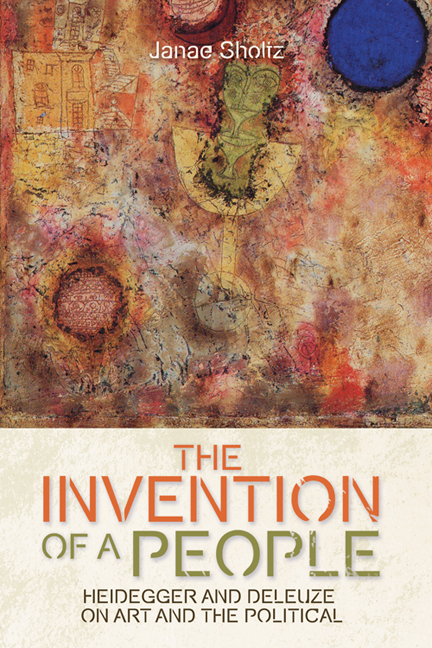Book contents
- Frontmatter
- Contents
- Acknowledgments
- Abbreviations
- Introduction: The People Are Missing
- PART I DIVERGENCE, THE POINT OF NIETZSCHE
- PART II (UN)THINKING, WHAT MUST BE THOUGHT
- PART III (UN)EARTHING A PEOPLE-TO-COME
- Introduction to Part III
- 5 Heidegger and the Political
- 6 Deleuze and the Political
- CONCLUDING EVENT
- Index
6 - Deleuze and the Political
from PART III - (UN)EARTHING A PEOPLE-TO-COME
Published online by Cambridge University Press: 05 August 2016
- Frontmatter
- Contents
- Acknowledgments
- Abbreviations
- Introduction: The People Are Missing
- PART I DIVERGENCE, THE POINT OF NIETZSCHE
- PART II (UN)THINKING, WHAT MUST BE THOUGHT
- PART III (UN)EARTHING A PEOPLE-TO-COME
- Introduction to Part III
- 5 Heidegger and the Political
- 6 Deleuze and the Political
- CONCLUDING EVENT
- Index
Summary
Fridge Plateau: Being True to the Earth, or Cosmic Artisantry
In ‘The Ends of Man’, Derrida presents a post-humanist, post-Heideggerian Nietzschean Overman, who will not be concerned with the meaning of being, but will instead ‘dance outside the house’, outside of being-at-home or homecoming, and from whose perspective the question of the truth of being would be the ‘last sleeping shudder of the superior man’. What we gather from this is that the question of the ‘we’ does not go away, but it does necessitate that the terrain of its conception must change. For Deleuze, who claims ‘thinking takes place in the relationship of territory and the earth’ (QP, 82/85), we can say that this endeavour to rethink the we means re-conceiving our relation to the earth. The question is ‘how is earth transformed in Deleuze's philosophy?’ and, then, ‘what does it mean to be true to it?’ We have given preliminary answers, developing a common refrain of the cosmic in Axelos and Klee. Here, we return to this matter in light of the untimely question of the we, drawing primarily from the fertile resources of Deleuze and Guattari's developed account of geophilosophy in What is Philosophy? and of a cosmic people in A Thousand Plateaus and inviting readers to imaginatively project themselves into the cosmic, artisanal space of Brian Fridge's Vault Sequence n. 10.
What is Philosophy? is remarkable in its clarity and directness, nowhere more evident than in its confrontation with Heidegger. In a stunning passage from the chapter devoted to geophilosophy, Deleuze claims that ‘however close he got to it, Heidegger betrays the movement of deterritorialisation because he fixes it once and for all between being and beings, between the Greek territory and the Western earth that the Greeks would have called Being’ (QP, 91/95). Deleuze makes two claims here, first with regard to ontological difference and, second, with regard to the philosophic history. In that Heidegger does not go farther than the Greeks, his questioning remains bound to the issue of ontological difference as developed from thinking the origin of philosophy as Greek.
- Type
- Chapter
- Information
- The Invention of a PeopleHeidegger and Deleuze on Art and the Political, pp. 235 - 262Publisher: Edinburgh University PressPrint publication year: 2015

